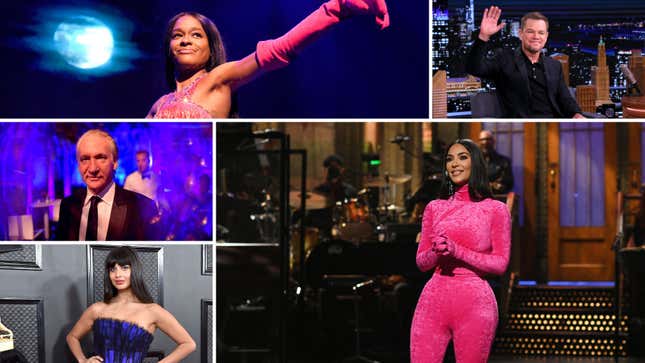It’s Time to Stop Framing Celebrities’ Most Banal Ideas As Intellect
Too often headlines weight random famous people's thoughts on politics and policy as need-to-know, no matter how mind-numbing the soundbite.
In Depth

Something rotten is in the state of celebrity media coverage: Whether or not stars display intellect, they’re often given undue attention for pontificating on matters outside of their lane. I’ve been noticing this for a while, but more than ever now that I sometimes handle Jezebel’s Dirt Bag gossip roundup and have to sift through a lot of headlines at once. And that’s where my eyes roll the hardest: the headlines.
I’ll give you a particularly vexing example from a story in the Hill in 2021: “Matt Damon on red-blue divide: ‘The things that really matter, really matter to all of us.’” This statement (of the obvious) ran as a headline despite Damon’s lack of any remote expertise in politics. No matter what the Hill did or did not do to contextualize the soundbite within the story itself, with its cadence of acquired wisdom that headline thrust Damon into the spotlight. In the same way that celebs took over for supermodels on the covers of fashion magazines, this fellatial treatment has allowed them to infiltrate discourse.
It’s a know-it-when-you-see-it kind of thing, the banal celebrity observation elevated because of status and not content but nonetheless prioritized as need-to-know:
“Justin Bieber: ‘I Really Don’t Believe in Abortion.’” “Jameela Jamil Says ‘Society Is Gonna Collapse’ if Federal Abortion Ban Happens: ‘We Are Already Way Over Our Heads.’” “Teen actor Jaden Smith says we’d be smarter if ‘The World Dropped Out Of School.’” “Viola Davis says critics ‘serve no purpose’ following negative The First Lady reviews.” “Jamie Lee Curtis says the ‘nepo baby’ conversation is ‘designed to try to diminish and denigrate.’” “Lizzo says ‘cancel culture is appropriation’: ‘It’s become trendy, misused and misdirected.’” “Kim Kardashian told women to ‘get [your fucking ass] up and work.’ Some people are saying it’s hypocritical.”
At least that last headline about Kim K gestured to a reality that doesn’t accept celebrity utterances as innately perceptive. But more often than not, this very visible tendency—“X Celebrity Said Y Shit About Z”—platforms tweet-worthy material into something that can easily be mistaken as useful information, or even worse, a patently correct decree. Barring rare instances, the celebrities whose ideas are glorified as intellect in headlines like these are not intellectuals in the classic sense. They are not, in The Ideas Industry author Daniel Drezner’s definition of the public intellectual, “experts who are versed and trained enough to be able to comment on a wide range of public policy issues,” who serve “a vital purpose in democratic discourse: exposing shibboleths masquerading as accepted wisdom.” They do not consistently take on the intellectual’s responsibility, in Noam Chomsky’s words, “to speak the truth and to expose lies.” In fact, a particularly cynical reading of their overall job description is that it largely involves telling lies, as ensconced in fantasy-building as it is.
My quibble is not with covering celebrities discussing their work, their lives, and their experiences with other celebrities (gossip is so inevitable, to complain about it is to yell at a cloud). Nor is it with covering celebrities who say particularly dumb things, especially when there’s palpable shade behind reporting on an objectively foolhardy utterance. It’s about how celebrities are now more than ever positioned as intellectuals who deserve to command headlines by a celebrity-hungry media that relies on aggregation.
-

-

-

-

-

-

-

-

-

-

-

-

-

-

-

-

-

-

-

-

-

-

-

-

-

-

-

-

-

-

-

-

-

-

-

-

-

-

-

-









































